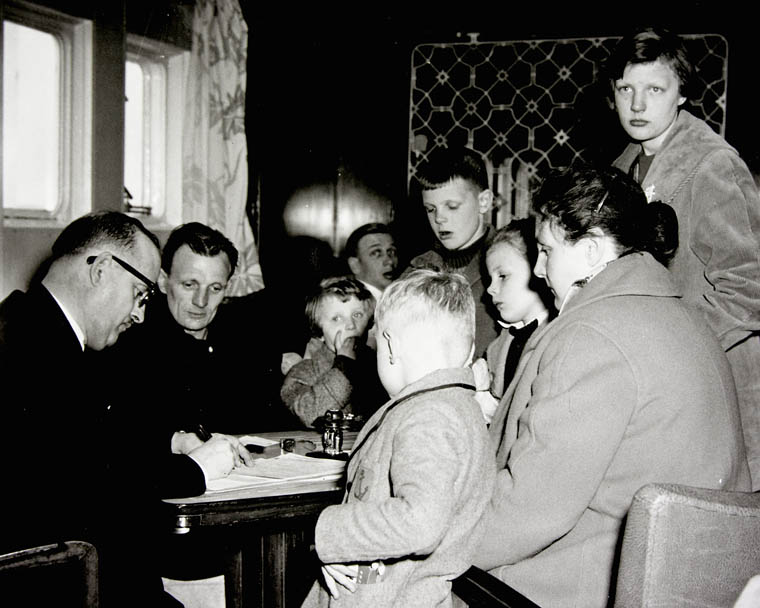Browse "Communities & Sociology"
-
Article
Divorce in Canada
Marriages in Canada can be dissolved through annulment or divorce, both of which involve a judicial decree.
"https://d2ttikhf7xbzbs.cloudfront.net/media/media/18e234be-ab36-4e5d-aae3-beb23bb8d8b7.jpg" // resources/views/front/categories/view.blade.php
https://d2ttikhf7xbzbs.cloudfront.net/media/media/18e234be-ab36-4e5d-aae3-beb23bb8d8b7.jpg
-
Article
Domestic Service (Caregiving) in Canada
Domestic work refers to all tasks performed within a household, specifically those related to housekeeping, childcare and personal services for adults. These traditionally unpaid household tasks can be assigned to a paid housekeeper (the term caregiver is preferred today). From the early days of New France, domestic work was considered a means for men and women to immigrate to the colony (see History of Labour Migration to Canada). In the 19th century, however, domestic service became a distinctly female occupation (see Women in the Labour Force). From the second half of the 19th century until the Second World War, in response to the growing need for labour in Canadian households, British emigration societies helped thousands of girls and women immigrate to Canada (see Immigration to Canada). In 1955, the Canadian government launched a domestic-worker recruitment program aimed at West Indian women (see West Indian Domestic Scheme). In 2014 the government lifted the requirement for immigrant caregivers to live with their employer to qualify for permanent residence — a requirement that put domestic workers in a vulnerable position. (See also Canadian Citizenship; Immigration Policy in Canada). Click here for definitions of key terms used in this article.
"https://d2ttikhf7xbzbs.cloudfront.net/media/media/3f5cab82-83b8-449c-a7f1-2bfff8549915.jpg" // resources/views/front/categories/view.blade.php
https://d2ttikhf7xbzbs.cloudfront.net/media/media/3f5cab82-83b8-449c-a7f1-2bfff8549915.jpg
-
Article
Dorothea Palmer
Dorothea Ferguson (née Palmer), birth control advocate, social worker (born 1908 in England; died 5 November 1992 in Ottawa, ON). Dorothea Palmer was arrested in 1936 for advertising birth control to women in a working-class neighbourhood in Ottawa. She was cleared of charges after a lengthy trial proved her work had been for the public good. Her acquittal was a major victory for the birth control movement in Canada.
"https://d2ttikhf7xbzbs.cloudfront.net/media/DorotheaPalmer/Dorothea Palmer.JPG" // resources/views/front/categories/view.blade.php
https://d2ttikhf7xbzbs.cloudfront.net/media/DorotheaPalmer/Dorothea Palmer.JPG -
Article
Doukhobors
Doukhobors are a sect of Russian dissenters, many of whom now live in western Canada. They are known for a radical pacifism which brought them notoriety during the 20th century. Today, their descendants in Canada number approximately 30,000, with one third still active in their culture.
"https://d2ttikhf7xbzbs.cloudfront.net/DCI-images/1908-Doukhobours-final-rescale.jpg" // resources/views/front/categories/view.blade.php
https://d2ttikhf7xbzbs.cloudfront.net/DCI-images/1908-Doukhobours-final-rescale.jpg
-
Article
Music of the Doukhobors
Fundamentalist Christian sect of Russian origin. The tenets of the Doukhobors' simple faith held them apart from what they considered the idolatry, opulence, and corruption of the Russian Orthodox Church.
"https://development.thecanadianencyclopedia.ca/images/tce_placeholder.jpg?v=e9dca980c9bdb3aa11e832e7ea94f5d9" // resources/views/front/categories/view.blade.php
https://development.thecanadianencyclopedia.ca/images/tce_placeholder.jpg?v=e9dca980c9bdb3aa11e832e7ea94f5d9
-
Article
Drumheller Strike
The Drumheller Strike of 1925 1925, ushered in a period of rival or "dual" unionism in Alberta's coalfields. The Drumheller miners, rejecting wage cuts negotiated by the United Mine Workers, struck in June 1925.
"https://development.thecanadianencyclopedia.ca/images/tce_placeholder.jpg?v=e9dca980c9bdb3aa11e832e7ea94f5d9" // resources/views/front/categories/view.blade.php
https://development.thecanadianencyclopedia.ca/images/tce_placeholder.jpg?v=e9dca980c9bdb3aa11e832e7ea94f5d9
-
Article
Dutch Canadians
From the earliest years of the 17th century, the Dutch were engaged in the fur trade on the Hudson River. In 1614, they established trading posts on Manhattan Island and at Fort Orange (present-day Albany, New York). But only after the American Revolution (1775-1783) did Dutch immigration to British North America (now Canada) begin. The Dutch who had long been settled in the Thirteen Colonies fit easily into Canadian society. Since that time, Canada has experienced three waves of immigration from the Netherlands, the largest of them after the Second World War.
"https://d2ttikhf7xbzbs.cloudfront.net/media/media/36937a2a-48f7-4146-a170-649f7f3daaab.jpg" // resources/views/front/categories/view.blade.php
https://d2ttikhf7xbzbs.cloudfront.net/media/media/36937a2a-48f7-4146-a170-649f7f3daaab.jpg
-
Article
Early Women’s Movements in Canada: 1867–1960
Women’s movements (or, feminist movements) of the 19th and early-20th century — often referred to as first-wave feminism — included campaigns in support of temperance, women’s suffrage, pacifism, as well as labour and health rights.
"https://d2ttikhf7xbzbs.cloudfront.net/media/media/569d6d96-ffeb-485f-aa88-98b968b29e2a.jpg" // resources/views/front/categories/view.blade.php
https://d2ttikhf7xbzbs.cloudfront.net/media/media/569d6d96-ffeb-485f-aa88-98b968b29e2a.jpg
-
Article
Easter, Lent, the Passion
Easter, Lent, the Passion. The term 'Easter music' is used to describe all music specific to the season beginning with Ash Wednesday, through Holy Week and ending with the Ascension.
"https://development.thecanadianencyclopedia.ca/images/tce_placeholder.jpg?v=e9dca980c9bdb3aa11e832e7ea94f5d9" // resources/views/front/categories/view.blade.php
https://development.thecanadianencyclopedia.ca/images/tce_placeholder.jpg?v=e9dca980c9bdb3aa11e832e7ea94f5d9
-
Article
Eh
The interjection eh — as in “I know, eh?” — is popularly considered to be a marker of Canadian speech. Canadians use eh more frequently than in any other country, and also have the most varied usage of the interjection. While eh has only two main constructions in England (as a request for repetition and to mark a question), there are 10 popular functions of eh in Canada, making it a true Canadianism. However, studies suggest that its usage is in decline, particularly among young, urbane Canadians. (See also Canadian English.)
"https://d2ttikhf7xbzbs.cloudfront.net/EH_.png" // resources/views/front/categories/view.blade.php
https://d2ttikhf7xbzbs.cloudfront.net/EH_.png
-
Article
Ehattesaht
The Ehattesaht are a Nuu-chah-nulth First Nation that occupies 660 km2 (66,000 hectares) of territory on the west coast of Vancouver Island. A member of the Nuu-chah-nulth Tribal Council, the Ehattesaht have 539 registered members as of October 2021.
"https://d2ttikhf7xbzbs.cloudfront.net/media/media/bef3cc60-b45e-4a19-b10f-b8248f21b21b.jpg" // resources/views/front/categories/view.blade.php
https://d2ttikhf7xbzbs.cloudfront.net/media/media/bef3cc60-b45e-4a19-b10f-b8248f21b21b.jpg
-
Article
Elites
As used every day, elite is an adjective referring to the upper echelon of any activity - eg, elite athletes or elite soldiers. Used more analytically as a noun, elites are those who hold the uppermost decision-making positions in important activities organized in a definite hierarchy.
"https://d2ttikhf7xbzbs.cloudfront.net/media/media/5090b907-78e2-4d1d-82a1-12e989970250.jpg" // resources/views/front/categories/view.blade.php
https://d2ttikhf7xbzbs.cloudfront.net/media/media/5090b907-78e2-4d1d-82a1-12e989970250.jpg
-
Article
Elizabeth Fry Society
The Elizabeth Fry Society is a not-for-profit social service agency that provides support for women and girls involved in the Canadian justice system. The Society provides a range of services to women who are criminalized and to women who are at risk of being criminalized. It works to reduce the impact of criminalization, to provide equal opportunities for women in the justice system and to empower marginalized women.
"https://d2ttikhf7xbzbs.cloudfront.net/media/Mrs._Fry_reading_to_the_prisoners_in_Newgate_John_Johnson.jpg" // resources/views/front/categories/view.blade.php
https://d2ttikhf7xbzbs.cloudfront.net/media/Mrs._Fry_reading_to_the_prisoners_in_Newgate_John_Johnson.jpg
-
Article
Emigration
Emigration refers to the act of leaving one's region or country of origin to settle in another. This is unlike immigration which is the action of arriving in a country.
"https://development.thecanadianencyclopedia.ca/images/tce_placeholder.jpg?v=e9dca980c9bdb3aa11e832e7ea94f5d9" // resources/views/front/categories/view.blade.php
https://development.thecanadianencyclopedia.ca/images/tce_placeholder.jpg?v=e9dca980c9bdb3aa11e832e7ea94f5d9
-
Article
Empire Day
Empire Day, observed annually on the school day preceding the May 24 holiday for Queen Victoria's birthday, was the most important patriotic rite for children in English-speaking Canada during the half century following its first observance 23 May 1899.
"https://development.thecanadianencyclopedia.ca/images/tce_placeholder.jpg?v=e9dca980c9bdb3aa11e832e7ea94f5d9" // resources/views/front/categories/view.blade.php
https://development.thecanadianencyclopedia.ca/images/tce_placeholder.jpg?v=e9dca980c9bdb3aa11e832e7ea94f5d9

